Lazy Gardening for the Future: Much More Mulch
There are a few basic procedures to follow to create a low maintenance garden, but the first and most important thing you can for your garden is to apply mulch.
If you do nothing else for your garden, mulch your plants. You don’t even have to dig first, but do pull out the weeds.
What Precisely is Mulch?
Mulch is an organic covering made up of leaves, pine (or any other) bark, compost, shredded wood (untreated), grass cuttings (just a little), shredded reeds and sticks, stones, gravel and anything else you can lay your hands on. There is no hard and fast rule about what constitutes mulch. A mixture of any of the above is laid at a depth, according to the experts, of 7 – 10cm over the soil and replaced annually. I never have enough mulch for more than a 4cm depth, so I mulch about three times a year. More importantly, many plants grow close to the ground and do not appreciate being smothered.
What Does Mulch Do?
Suppresses weeds:
Expect a 90% reduction in weed growth.
Prevents water loss:
A week after rain when the surrounding soil is bone dry, a mulched bed will still be moist and cool.
Encourages beneficial soil organisms:
Your soill will come alive, and along with it, your garden.
Improves soil structure and drainage:
You may never have to dig a bed again!
Adds nutrients to the soil:
I never have bothered much with fertilizers due to the expense and because I’m lazy, but it’s nice to know that I don’t have to feel guilty about it anymore.
Keeps soil warm in winter and cool in summer.
Need more be said?
The days of neatly raked beds with bags of garden litter carried off to the dump are over. It takes many people a bit of a mind shift to accept that a mulched bed is not a messy bed, but rather a living, life-giving and time saving solution that takes the place of a myriad of tedious garden chores.


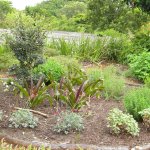
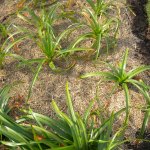
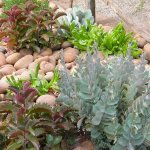
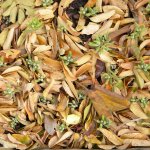
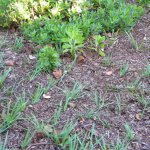
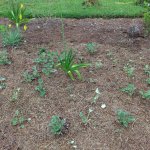


Comments
Veg Garden Mulching
Since the beginning of Spring, I went on a vegetable garden escapade. As I have never grown vegetables before, I was quite unaware of what I was getting into! At first my seeds would germinate and before long they would wither and die in arid conditions of where I live.
After reading your post about mulching I decided to go on a mulching escapade! I have covered my entire vegetable garden with mulch and what a difference it has made! My seedlings are happy and the soil is alive with little critters. Weeds only pop up here and there on occasion and pulling them out is a breeze as the soil is always moist enough to just pull them out.
I was previously also digging the beds over regularly as the soil is almost pure red clay and when the sun bakes it, is becomes like rock and nothing can grow. Digging it over so regularly often damaged the roots of the plants that were surviving, causing even them to wither and wilt.
After mulching, my garden brings me more pleasure and less stress!
Thank you for the advice!
Mulching vegetables
Thanks for your comment. Glad to hear we have another convert. Be careful to leave a small space around the seedlings: root crops tend to get weakened, and chard, tomatoes and peppers quickly develop fungus infections if their stems get humid. Hope to see pics of your veggie garden and crops sometime.
Sugarcane mulch
Hi All, I am no salesman but an Agronomist.
I also love gardening and saw a lot of blogs talking about and loving sugarcane mulch.
I see that a lot of people in SA are interested in the sugarcane mulch, but there are no suppliers of it in SA. Our company is starting a new project in March, where sugarcane is going to be mechanically harvested green (where it is normally burnt) and the trash will be separated and available as animal feed, electricity generation etc., and I was thinking...what about garden mulch? So there is no established product that I am trying to sell to you, all I'm saying is that if you come across readers who are interested in a cheap great garden mulch, then they can contact me. We are situated in the Lowveld region of Mpumalanga, but we can arrange transport. If you have a look at the Australian market, you will see the happy users of sugarcane mulch.
Happy gardening!
hestiasaaiman@gmail.com
Sugarcane mulch
Would love to be able to get sugarcane mulch in Cape Town as have seen it used extensively in Australian gardening programs. Come on all you entrepreneurs in the Western Cape, there must be an opportunity here!
Sugarcane mulch
Dani, I also think there is huge potential here. It's only been a few months in and already a lot of the local macadamia farmers have bought the mulch from us for their orchards. The only issue to CapeTown is the transport component since the product has a low density. But we are working on a method to compress it so that we can get better payloads, then maybe trucks to Capetown can be viable. We have also made bales out of it, which was really helpful to some farmers for animal feed during the drought period (see photo). Like I said, I'm not selling anything, I just think there is huge value in this stuff, you won't find a cheaper mulch anywhere else. Kind regards
Compost as mulch
What are the drawbacks or benefits of using compost as mulch? Are any of the alternatives better?
Using compost as mulch
Hi Derik
This is my experience with using compost as a mulch:
Compost does not retain moisture as successfully as mulch;
Compost breaks down too quickly compared to mulch;
Compost is too costly to cover all my garden beds with a 10cm layer;
Many indigenous plants in my area are happier with less-fertile soil and,
most importantly,
Compost does not suppress weeds.
I prefer to use compost very selectively, under a good layer of mulch made of leaves, wood chips, nut shells, sticks, chopped straw....whatever I can find.
Hope this answers your question.
Kind regards
Lorraine
Add new comment